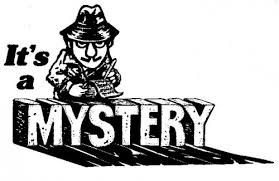mystery
英 [ˈmɪs.tər.i]
美 [ˈmɪs.tɚ.i]
- n. 秘密,谜;神秘,神秘的事物;推理小说,推理剧;常作 mysteries 秘技,秘诀
使用频率:

记忆方法
记忆“mystery”可以采用形声记忆法。想象“my”代表“me”,即“我”,“ster”类似于“star”,即“星星”。想象一个星星上覆盖着神秘的迷雾,因此,“mystery”代表“my star”背后的神秘。这种方法结合了单词的部分音节和意义,帮助记忆。
以上内容由AI生成, 仅供参考和借鉴
中文词源
mystery 神秘,奥秘
来自希腊语mysterion,神秘的仪式,神秘的教条,来自mystes,开悟的人,神点化的人,通灵的人,巫师,来自myein,关闭,合眼,合嘴,词源同mute,myopia.可能来自巫师做法时的神态。原带有强烈的宗教色彩,后词义通用化,引申词义神秘,奥秘。
英语词源
- mystery
-
mystery: [14] Greek múein meant ‘close one’s eyes or mouth’, and hence was used figuratively for ‘keep secret’. Its association with secret initiation ceremonies inspired the formation from it of muein ‘initiate’, whose derivative mústēs meant ‘initiated person’. This in turn formed the basis of mustérion ‘secret ceremony, secret thing’, which passed into English via Latin mystērium. Also derived from mústēs was mustikós, from which ultimately English gets mystic [14] and mystical [15].
=> mystic - mystery (n.1)
- early 14c., in a theological sense, "religious truth via divine revelation, hidden spiritual significance, mystical truth," from Anglo-French *misterie, Old French mistere "secret, mystery, hidden meaning" (Modern French mystère), from Latin mysterium "secret rite, secret worship; a secret thing," from Greek mysterion (usually in plural mysteria) "secret rite or doctrine," from mystes "one who has been initiated," from myein "to close, shut" (see mute (adj.)); perhaps referring to the lips (in secrecy) or to the eyes (only initiates were allowed to see the sacred rites).
The Greek word was used in Septuagint for "secret counsel of God," translated in Vulgate as sacramentum. Non-theological use in English, "a hidden or secret thing," is from late 14c. In reference to the ancient rites of Greece, Egypt, etc. it is attested from 1640s. Meaning "detective story" first recorded in English 1908. - mystery (n.2)
- "handicraft, trade, art" (archaic), late 14c., from Medieval Latin misterium, alteration of Latin ministerium "service, occupation, office, ministry" (see ministry), influenced in form by Medieval Latin mysterium (see mystery (n.1)) and in sense by maistrie "mastery." Now only in mystery play, in reference to the medieval performances, which often were staged by members of craft guilds. The two senses of mystery formed a common pun in (secular) Tudor theater.
权威例句
- 1. The mystery hero imme-diately alerted police after spotting a bomb.
- 那个无名英雄发现炸弹后马上报了警。
- 2. The Italian economic miracle has always been a mystery.
- 意大利的经济奇迹一直是个谜。
- 3. For years the teaching of acting has been shrouded in mystery.
- 多年以来表演教学一直蒙着神秘的面纱。
- 4. We set out to find the truth behind the mystery.
- 我们开始着手揭开谜团背后的真相。
- 5. His fourth novel is a murder mystery set in London.
- 他的第四部小说讲述的是一起发生在伦敦的神秘谋杀案。
